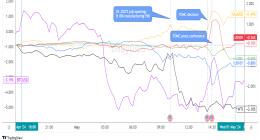
Twenty years ago, a new breed of energy companies promised consumers that deregulation of the electricity industry would cut their power bills.
The opposite happened.
U.S. consumers who signed up with retail energy companies that emerged from deregulation paid $19.2 billion more than they would have if they’d stuck with incumbent utilities from 2010 through 2019, a Wall Street Journal analysis of U.S. Energy Information Administration data found.
Retail energy companies buy electricity from generators—power-plant operators, wind farms, solar-power firms—and sell it to consumers, usually over the local utilities’ wires. Giving consumers a choice between their old utilities and new rivals, the argument for deregulation went, would create competitive pricing.
But in nearly every state, they have charged more than their incumbent utilities in each of the five years from 2015 through 2019, the Journal analysis found. The Journal’s analysis of power prices in 13 states and the District of Columbia excluded other states where retail companies supplied less than 1% of residential electricity in 2019.









